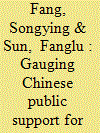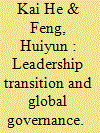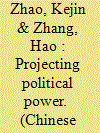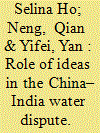|
|
|
Sort Order |
|
|
|
Items / Page
|
|
|
|
|
|
|
| Srl | Item |
| 1 |
ID:
167320


|
|
|
|
|
| Summary/Abstract |
In recent years, Beijing has significantly increased its support for UN peacekeeping operations (UNPKOs). Of the five permanent members of the Security Council, China is currently the largest troop-contributing country and the second-largest financial contributor to the UN peacekeeping budget. What is the view of the Chinese public on its country’s involvement in peacekeeping operations? We investigate the question using a public opinion survey experiment conducted in China. Our main findings are, first, that respondents showed a high level of support generally for China’s participation in peacekeeping operations but highest of all when China performed a leadership role. Secondly, China’s particular interest in a host country did not affect the degree of public support for China’s involvement; however, respondents did perceive broad benefits to China’s international reputation from such activities. Thirdly, although there was a similar level of support for China’s participation in peacekeeping whether the mission was authorised by the United Nations or by the African Union, neither was seen as a substitute for host state consent. Finally, respondents generally preferred China to make personnel (military and police) contributions in addition to financial contributions. These findings provide important insights into the domestic motivations for Beijing’s future peacekeeping policy and attendant constraints in this regard.
|
|
|
|
|
|
|
|
|
|
|
|
|
|
|
|
| 2 |
ID:
167319


|
|
|
|
|
| Summary/Abstract |
The establishment of the Asian Infrastructure Investment Bank (AIIB) signified China’s ‘charm offensive’ towards multilateral institutions and existing global financial governance. If the rise of China is inevitable, what will the future world look like, and what should other countries be prepared for? Borrowing insights from institutional balancing theory and role theory in foreign policy analysis, this project introduces a ‘leadership transition’ framework to explain policy dynamics in global governance, with the AIIB as a case study. It suggests that China, the United States, and other countries have employed different types of institutional balancing strategies, i.e. inclusive institutional balancing, exclusive institutional balancing, and inter-institutional balancing, to compete for influence and interest in the process of establishing the AIIB. A state’s role identity as a ‘leader’, a ‘challenger’, or a ‘follower’ will shape its policy choices in global governance regarding different institutional balancing strategies in the process of ‘leadership transition.’ Institutional balancing is a new type of balancing among states in the future transformation of global governance. China’s institutional rise in global governance, therefore, might be more peaceful than widely predicted.
|
|
|
|
|
|
|
|
|
|
|
|
|
|
|
|
| 3 |
ID:
167321


|
|
|
|
|
| Summary/Abstract |
In spite of fiscal pressure at home and China’s continued rise abroad, the United States shows no signs of reversing its costly grand strategy of deep engagement. In the context of America’s relative decline, we evaluate existing proposals to ease pressure on the United States. We argue that the key aspects of American decline are often operational rather than strategic in nature; consequently that the undifferentiated fashion in which rise and decline is often presented is not useful in describing current changes or in proposing how to address them. Problems at the operational level do not necessarily demand higher-level strategic level alterations. As such, although restructured forms of deep engagement will help alleviate resource constraints in the medium to long term, their utility in addressing the operational changes wrought by relative decline are less apparent. Given that resource constraints are not necessarily the primary concern, therefore, the major strategic elements of American deep engagement are more durable than commonly supposed. America’s current strategic objectives are not constrained by changes by virtue of its relative material decline with respect to China but by changes in the operational environment.
|
|
|
|
|
|
|
|
|
|
|
|
|
|
|
|
| 4 |
ID:
167322


|
|
|
|
|
| Summary/Abstract |
Policy communities throughout the world tend to agree that in recent years China has become more assertive in its maritime disputes with neighbouring countries. However, scholars vehemently disagree about the underlying motivations for such a change, whether structural factors, China’s external pressures, or growing overseas interests. This article argues that existing analysis runs the risk of dismissing the embedded logic of domestic legitimacy as the single most important explanation. China’s maritime strategy has almost always served the goal of legitimisation in consistence with the Party’s central enterprises, be they survival, modernisation, or political influence/power. The rise of naval nationalism from within has pushed the central leadership to respond with determination for the sake of maintaining credibility as ‘national saviour and protector’. More importantly, in view of the bureaucratic fragmentation in China’s maritime governance, new policy actors can forward their own interests by appealing to nationalist sentiments, and to the Party’s new central task of projecting political power. Our case studies on Sansha City, the Diaoyu/Senkaku Islands, and the Haiyang Shiyou 981 Drilling Rig bring in supportive evidence. Specifically, they demonstrate that all extant explanations may indeed influence China’s maritime strategy, but mostly through their impact on domestic legitimacy. Based on our legitimacy thesis, it can be predicted that, if the central leadership manages to consolidate its domestic legitimacy, China will assume a more moderate, cooperative, and constructive attitude towards maritime disputes.
|
|
|
|
|
|
|
|
|
|
|
|
|
|
|
|
| 5 |
ID:
167323


|
|
|
|
|
| Summary/Abstract |
Both the Chinese and Indian governments have made assiduous efforts to desecuritise their water dispute. This is puzzling, because both countries have securitised most of the disputes between them, including the border dispute, Tibet, and the Dalai Lama issue. The triggers for securitisation exist in the China–India water dispute. Both countries are water-scarce, prone to floods and droughts in their shared river basins, and the water dispute is inextricably linked to their border dispute. Power asymmetries between the two countries also incentivise both sides to securitise their water dispute. China, the upstream riparian and more powerful of the two, could use water as leverage in border negotiations, while India could use securitisation as a tactic to gain attention and offset China's greater aggregate power. The tendency is also for water disputes around the world to be painted as existential threats. Why, then, do China and India desecuritise their water dispute? Furthermore, despite desecuritisation, cooperation between them has remained low, confined to an expert-level mechanism, and memorandums of understandings on sharing hydrological data. This refutes the conventional view that desecuritisation is a normative good that can lead to genuine cooperation. This paper uses the Q methodology, which is a quantitative measure of ideas and perceptions, to address these puzzles. Based on a Q survey of Chinese and Indian experts on the water conflict, we argue that ideas are essential to shaping Chinese and Indian behaviour. Material explanations do not adequately explicate the complexities and nuances of the water dispute because they are too broad and general to be useful. The Q survey revealed in depth the myriad of ideas and debates surrounding the water dispute. These views and beliefs explain why the Chinese and Indian governments desecuritise their water dispute and why, despite desecuritisation, cooperation remains low.
|
|
|
|
|
|
|
|
|
|
|
|
|
|
|
|
|
|
|
|
|